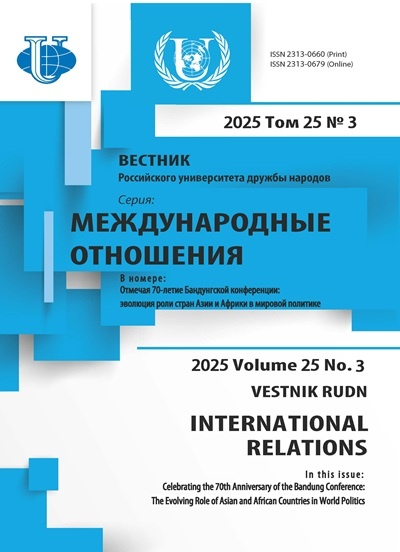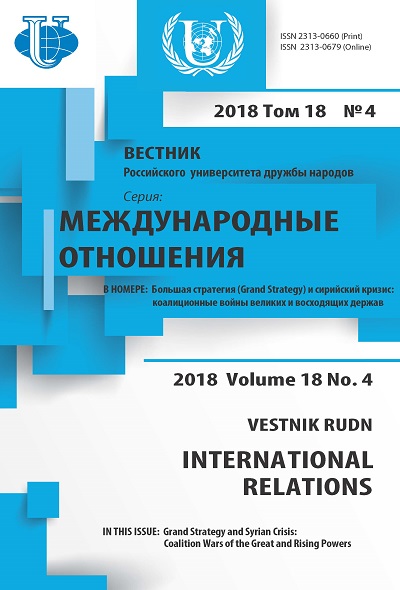Российско-вьетнамское сотрудничество в энергетике
- Авторы: Нгуен Т.Л.1, Черненко Е.Ф.1
-
Учреждения:
- Российский университет дружбы народов
- Выпуск: Том 18, № 4 (2018): Большая стратегия (Grand Strategy) и сирийский кризис: коалиционные войны великих и восходящих держав
- Страницы: 906-924
- Раздел: МЕЖДУНАРОДНЫЕ ЭКОНОМИЧЕСКИЕ ОТНОШЕНИЯ
- URL: https://journals.rudn.ru/international-relations/article/view/20331
- DOI: https://doi.org/10.22363/2313-0660-2018-18-4-906-924
- ID: 20331
Цитировать
Полный текст
Аннотация
Обилие энергетических ресурсов, в том числе возобновляемых и невозобновляемых, является центральным элементом развития энергетического сектора. Тем не менее, другие решающие факторы, такие как технологии и человеческие ресурсы, превращают ресурсы, дарованные природой, в экономическую выгоду для обеспечения качества. В 1950-х гг. молодая Демократическая Республика Вьетнам сделала приоритетной задачу формирования энергетического сектора в плане экономического развития, чтобы быть более самостоятельной в сфере энергетической безопасности. Единственным международным источником поддержки для страны в то время были союзникикоммунисты. Советский Союз взял на себя основную ответственность как крупнейший благотворитель для Демократической Республики Вьетнам в военное время. В дополнение к военным и материально-техническим средствам для борьбы Демократической Республики Вьетнам в Северном Вьетнаме с поддерживаемым США правительством Республики Вьетнам в Южном Вьетнаме за объединение Советский Союз также активно поддерживал своего партнера в реализации пятилетних экономических планов для развития социализма, включая формирование и развитие энергетического сектора. В послевоенное время СССР продолжал поддерживать недавно объединенную страну, Социалистическую Республику Вьетнам, для развития энергетического сектора как своего передового экономического сектора. Российская Федерация и Вьетнам продолжают углублять двустороннее сотрудничество в области энергетики с успешным управлением многомиллиардными совместными предприятиями в нефтегазовой отрасли и реализуют многие проекты в энергетическом секторе. Партнерство в энергетической сфере становится наиболее заметной областью сотрудничества за 68-летнюю историю двусторонних отношений. Статья посвящена вопросам сотрудничества России и Вьетнама в энергетике. Авторы акцентируют внимание на ведущей роли СССР, а после его распада России в формировании и развитии энергетики Вьетнама. Рассмотрены конкретные проекты совместной деятельности. В статье анализируется эволюция отношений двух стран в разные исторические периоды. Подчеркивается, что развитие национальной энергетики для Вьетнама является важнейшей сферой российско-вьетнамских двусторонних отношений на протяжении всей их истории и, безусловно, одним из приоритетов для Вьетнама в настоящее время. В свою очередь, Россия с учетом своих внешнеполитических ориентиров нацелена на активизацию сотрудничества с Вьетнамом с перспективой расширения границ взаимодействия с этой страной не только в энергетической сфере.
Об авторах
Тхи Лан Нгуен
Российский университет дружбы народов
Автор, ответственный за переписку.
Email: 1032165943@rudn.ru
магистрант кафедры теории и истории международных отношений, Российский университет дружбы народов
Елена Федоровна Черненко
Российский университет дружбы народов
Email: chernenko-ef@rudn.ru
кандидат экономических наук, доцент кафедры теории и истории международных отношений Российского университета дружбы народов
Список литературы
- Зеленкова М.С. Перспективы возврата Вьетнама к вопросу строительства АЭС // Юго-Вос¬точная Азия: актуальные проблемы развития. 2018. Т. 1. № 1 (38). С. 177—188.
- Истомин И.А. Сравнительный анализ приоритетов российской внешней политики и научно-образовательного сообщества специалистов по международным отношениям // Вестник Российского университета дружбы народов. Серия: Международные отношения. 2018. Т. 18. № 1. С. 66—84. doi: 10.22363/2313-0660-2018-18-1-162-185.
- Кобелев Е.В. Российско-вьетнамские отношения: реальность и перспективы // Вьетнамские исследования. Вып. 5. М.: Институт востоковедения РАН, 2015. С. 21—43.
- Костюнина Г.М. Свободные экономические зоны в практике Вьетнама // Юго-Восточная Азия: актуальные проблемы развития. 2018. № 2 (39). С. 121—135.
- Михоко К. Особенности и задачи развития российско-вьетнамского стратегического партнер¬ства (2001—2014 гг.) // Вьетнамские исследования. Вып. 5. М.: Институт востоковедения РАН, 2015. С. 55—72.
- Нархова Е.И. Аналитический обзор вьетнамской литературы по проблематике Южно-Китайского моря // Юго-Восточная Азия: актуальные проблемы развития. 2017. № 37. С. 121—131.
- Нгуен Минь Нгок. Южно-Китайское море: геополитика, интересы, курс и деятельность заин¬тересованных стран. Ханой: World Publishing House, 2013а. (на вьет. яз.).
- Нгуен Минь Нгок. Южно-Китайское море: контроль над ситуацией и методы решения. Ханой: World Publishing House, 2013б. (на вьет. яз.).
- Новые вызовы и механизмы безопасности в Восточной Азии / под ред. В.М. Мазырина. М.: ФОРУМ, 2016.
- Скопин А.Ю. Стратегия России в мире, Евразии и Юго-Восточной Азии // Юго-Восточная Азия: актуальные проблемы развития. 2018. № 2 (39). С. 28—34.
- Цветкова Н.Н. Антироссийские санкции и проблема диверсификации торгово-экономических связей РФ // Восток между Западом и Россией / под ред. А.М. Хазанова. М.: Институт востоковедения РАН, 2015. С. 74—94.
- Baev P.K., Tonnesson S. Can Russia Keep its Special Ties with Vietnam while Moving Closer and Closer to China? // International Area Studies Review. 2015. Vol. 18. N 3. P. 312—325. DOI: 0.1177/2233865915596709.
- Cherry H. Vietnam. Nothing Ever Dies: Vietnam and the Memory of War By Viet Thanh Nguyen. Cambridge, MA: Harvard University Press, 2016. P. 374. Plates, Notes, Bibliography, Index // Journal of Southeast Asian Studies. 2018. Vol. 49. N 1. P. 177—179. doi: 10.1017/S002246341700087X.
- Filimonova N. Russia — Vietnam: Cooperation in the Arctic? // The Diplomat. December 11, 2015. URL: https://thediplomat.com/2015/12/russia-vietnam-cooperation-in-the-arctic/ (accessed: 15.09.2018).
- Kozyrev V. Russia—Vietnam Strategic Partnership: The Return of the Brotherhood in Arms? // Russian Analytical Digest. 2014. N 145. P. 8—11. URL: http://www.css.ethz.ch/content/ dam/ethz/special-interest/gess/cis/center-for-securities-studies/pdfs/RAD-145-8-11.pdf (accessed: 26.08.2018).
- Le Viet Trung, Tran Quoc Viet, Pham Van Chat. An Overview of Vietnam’s Oil and Gas Industry // Journal on Petroleum Economics & Management. 2016. Vol. 10. P. 64—71.
- Mazyrin V.M. Russia and Vietnam: Building a Strategic Partnership. Russia and ASEAN-4: Potential and Realms of Cooperation // Russia — ASEAN: Foundations and Prospects of a 15-year Old Partnership. Singapore: ISEAS, 2012. P. 173—183.
- Nguen Minh Ngoc. Interests and policy of Japan, Russia, India and Australia in the South China Sea // Search for the Solution into the Name of Peace and Justice in the South China Sea. Hanoi. P. 34—61.
Дополнительные файлы










